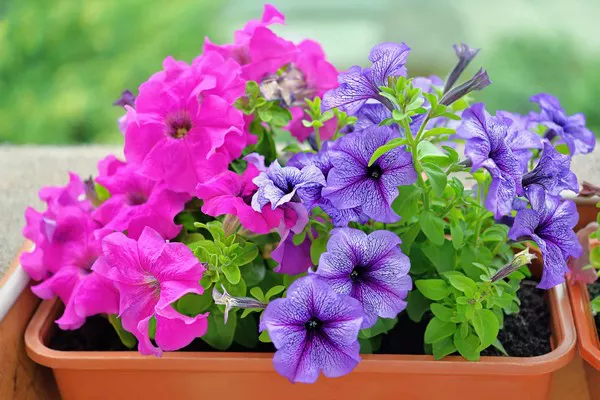Petunias are renowned for their vibrant blooms and are a popular choice for gardens, balconies, and hanging baskets around the world. Their colorful petals and low maintenance make them a favorite among gardeners and flower enthusiasts alike. However, a common concern among pet owners, particularly dog owners, is whether these beautiful flowers pose any threat to their furry companions. In this article, we’ll delve into the question: are petunia flowers poisonous to dogs?
Understanding Petunias:
Before exploring their potential toxicity, it’s essential to understand what petunias are and the common varieties available. Petunias (Petunia spp.) belong to the Solanaceae family, which includes other popular plants like tomatoes, potatoes, and tobacco. These flowering plants are native to South America and come in various colors, including purple, pink, red, white, and even bi-colored varieties.
Petunias are typically cultivated as annuals, though some varieties are perennial in warmer climates. They thrive in full sun and well-drained soil, making them versatile additions to gardens, borders, and containers. With proper care, petunias can bloom prolifically throughout the growing season, providing a stunning display of color.
Common Concerns:
Despite their beauty and popularity, pet owners often express concerns about the potential toxicity of petunias to dogs. This worry stems from the fact that several plants within the Solanaceae family, such as nightshade and belladonna, are known to be toxic to both humans and animals due to the presence of alkaloids like solanine and atropine.
Additionally, pet owners may observe their dogs showing interest in chewing or ingesting plants, which further fuels concerns about potential poisoning. As responsible pet owners, it’s crucial to prioritize the safety and well-being of our furry friends by being aware of any potential hazards they may encounter in their environment.
Examining Petunia Toxicity:
To address the question of whether petunia flowers are toxic to dogs, it’s essential to consult reliable sources and research studies. According to the American Society for the Prevention of Cruelty to Animals (ASPCA), petunias are classified as non-toxic to dogs. This means that these flowers are generally considered safe and unlikely to cause significant harm if ingested in small quantities.
Furthermore, the Pet Poison Helpline, a 24/7 animal poison control center, also confirms that petunias are not considered toxic to dogs. They state that while ingesting large amounts of any plant material may cause gastrointestinal upset in pets, including vomiting and diarrhea, petunias are not among the plants known to cause severe poisoning or adverse reactions in dogs.
Factors to Consider:
While petunias themselves are not inherently toxic to dogs, several factors should be considered to ensure the safety of pets in a garden or outdoor environment:
1. Potential Contamination: Although petunias are safe for dogs, other plants in the garden may be toxic. It’s essential to identify and remove any poisonous plants that pose a risk to pets.
2. Chemical Exposure: Pesticides, herbicides, and fertilizers used in gardening can be toxic to dogs if ingested. Always follow label instructions and keep pets away from treated areas until chemicals have dried or dissipated.
3. Choking Hazard: While petunias are not toxic, ingesting large quantities of any plant material can lead to gastrointestinal issues or obstruction. Monitor pets closely and discourage excessive chewing or ingestion of flowers or foliage.
4. Allergic Reactions: While rare, some dogs may have allergic reactions to pollen or plant material. Watch for signs of itching, swelling, or respiratory distress, and consult a veterinarian if any adverse reactions occur.
Safe Gardening Practices:
To create a pet-friendly garden that is both beautiful and safe for dogs, consider the following tips:
1. Choose non-toxic plants: Opt for pet-safe flowers and foliage, such as petunias, marigolds, and zinnias, to minimize the risk of poisoning.
2. Create barriers: Use fencing, raised beds, or designated areas to keep dogs away from potentially harmful plants or garden chemicals.
3. Supervise outdoor time: Monitor pets closely while they explore the garden, and discourage behaviors like digging, chewing, or eating plants.
4. Provide alternatives: Offer safe chew toys, treats, or interactive play to redirect your dog’s attention away from plants and flowers.
5. Seek veterinary advice: If you suspect your dog has ingested a toxic plant or is showing signs of illness, contact your veterinarian or an animal poison control hotline for guidance and assistance.
Conclusion
Petunia flowers are generally considered safe for dogs and are not toxic if ingested in small quantities. While pet owners should always be mindful of potential hazards in the garden, including toxic plants and chemical exposures, petunias themselves are unlikely to cause significant harm to dogs. By practicing safe gardening habits, monitoring pets closely, and seeking veterinary advice when needed, pet owners can enjoy the beauty of petunias without compromising the safety of their furry companions.


